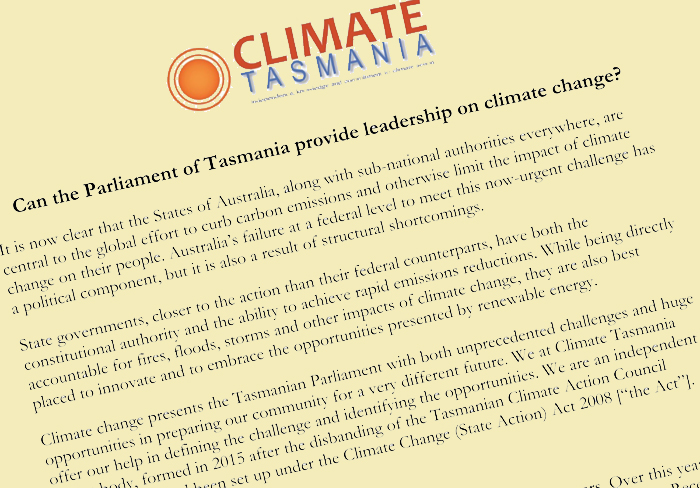Tasmania’s parliament must unite and legislate to reduce greenhouse emissions.

Letter sent to all Tasmanian state MPs last week.
To Tasmanians, last week’s weather on the US east coast was a local affair, not our business. But what that weather says about our climate is very much our business.
The astonishing story of Hurricane Florence, which is still unfolding, will be remembered not for wind but water. It dumped 30 cubic kilometres of water on North Carolina alone, with rainfall in some local areas amounting to a one-in-1000 year event.
Last year Hurricane Harvey, which inundated much of the southern US with over a metre of rain, was also called a one-in-1000 year event, and in 2016 Hurricane Matthew broke flood records in the Carolinas.
We hear about what happened in the US because it has a loud voice, but this year alone unprecedented rainfall has afflicted millions of others across east Africa, Japan and southern India.
Big rain events are key markers of a warming climate. Basic physics tells us that air can hold seven per cent more water for every degree it warms, so it follows that the current 1C of warming since pre-industrial times will deliver heavier rain and bigger floods.
We don’t need to look far afield to see results. In 2016 huge floods devastated farms and infrastructure in northern Tasmania, and a record-breaking one-day rain event four months ago caused a spectacular, damaging and costly flash flood in Hobart.
Add to that impact the threat posed by another strong indicator of climate change, sea level rise, and you have, as they say, a perfect storm. With sea levels now rising at double the average rate last century, the chance of coastal flooding at any time of year is increasing at an accelerating pace.
Flooding of the magnitude experienced in Africa, Asia and North America this year is a sign of things to come. Poor countries will be worst hit, partly because national self-interest in the richer world has denied them promised funding to help them prepare for their climate future.
This help serves rich countries as much as poor ones. Floods, rising seas, excessive heat and drought will drive people to migrate from vulnerable poor countries to places less vulnerable, which is in no-one’s interest.
But it isn’t just the poor parts of the world that will suffer damage from climate change. We’re all in this together. Some governments, including our own, don’t seem to understand this.
River and coastal flooding is near the top of Tasmania’s list of climate impacts. Planning to minimise that risk, including strengthening coastal defences and banning development in vulnerable areas, has to be high on the to-do list for state and local authorities. But that’s just the start.
Warmer conditions increase the risk of catastrophic wildfire on our already-vulnerable island. Extreme, more erratic weather will disrupt food production, and a warming sea will do the same for fish farms, not to mention its impact on natural fisheries.
Rising temperatures will irreparably damage natural ecosystems including ancient rainforest, and cause snowfields to disappear from Tasmania by mid-century. New disease vectors and deaths from extreme weather will put public health under growing pressure.
Our electoral cycle is just four years; these developments will unfold over time periods much longer than that. But we rightly expect our leaders to plan for developments well beyond the next election.
After a brief debate, a parliamentary vote abolished the government’s Tasmanian Climate Action Council in 2014. The same year former members set up Climate Tasmania to provide independent advice on climate change and policy responses.
In 2016 this small but authoritative group asked me to join it, which I did. Its expertise takes in science (three members are climate scientists), farming, the law, public health, engineering, youth activism and administration. I think I’m the least qualified member.
Last week, Climate Tasmania sent a letter to all members of the Tasmanian parliament offering its help to frame new climate change legislation and strategies in response to “unprecedented challenges and huge opportunities in preparing our community for a very different future.”
It’s past time to end the silence. It is categorically wrong that Australia continues to avoid strong action on grounds that we produce a small proportion of global greenhouse pollution (not so small really – around 1.5 per cent), and it’s equally wrong for Tasmania to sit on its hands.
Not just morally wrong – our per-capita emissions are high by global standards – but self-defeating as well. What does it say about us when we can’t do anything until others have acted? What kind of leadership is that, and what kind of future would we have if everyone did the same?
Tasmania can lead Australia’s climate response by phasing out imported fuels and transitioning to clean, home-grown electrical energy. We just need our politicians to get serious and put aside partisan differences for the greater good. This is surely not too much to ask.
To read the letter to MPs, go to the Climate Tasmania website.
